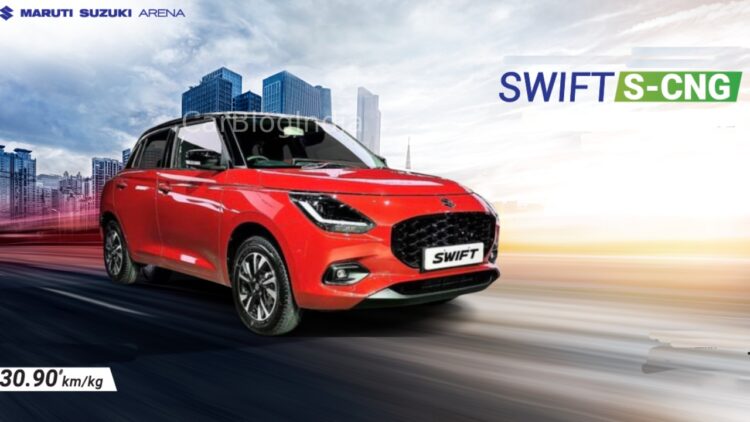In this post, we shall take a look at the running cost comparison between Maruti Swift petrol and CNG. Swift has recently been launched in its 4th generation avatar. However, the CNG variant is missing at the moment. But the outgoing model also had the CNG trim. That means it is just a matter of time before we will get it with the new Swift as well. Nevertheless, we can make some basic assumptions about the statistics of the CNG trim from the last-gen Swift to calculate the running costs. The aim is to see if it makes sense to shell out a premium for a CNG car.
Maruti Swift Petrol vs CNG – Running Costs
This video comes from EM CARS on YouTube. The host has explained the procedure to calculate the running costs in a step-wise manner. For this post, we are considering the mileage of the new Swift in manual trim to be 24.8 kmpl. That is what the company claims. The mileage of the CNG trim of the last-gen model was around 30 km/kg. Also, the CNG variant commanded a premium of approximately Rs 1 lakh over the same model in the petrol version. Therefore, we must figure out if the low running costs associated with CNG powertrain will be able to offset this premium in a defined time period. The table below summarizes all these aspects.
| Maruti Swift | Petrol | CNG |
| Mileage | 24.8 kmpl | 30 km/kg (Old Swift CNG Mileage) |
| Cost Per Litre | Rs 94.8 | Rs 80.12 |
| Running Cost Per km | Rs 3.8 | Rs 2.67 |
| Distance Per Day | 25 km | 25 km |
Now, there are a couple of scenarios we must explore. If someone drives an average of 25 km per day, this turns out to be around 9,125 km per year. As per the difference in running costs, you be savings of around Rs 10,500. With this math, it would take around 9.5 years to recover the increased initial cost. However, if we take the average running to be 75 km, the calculations tell us that it would be around 3.5 years before that extra premium as the cost can be recovered. On top of that, the host also mentions that the maintenance of the CNG car is more frequent in comparison to the petrol model. Moreover, practicality has to be compromised in terms of boot space and performance. As a result, he questions the point of choosing the CNG variant of any car.
Our View
I agree with his analysis for the most part. But people who travel a lot generally opt for CNG cars. That is how it is financially feasible. In fact, that is the reason why city fleet operators go for the CNG powertrain. Their running is high and the need for boot space is not needed constantly. Hence, it makes perfect sense for them. But for regular folks with less running, it might not be the best idea. Not to mention, not every city in the country has appropriate and adequate infrastructure for CNG filling stations.
Disclaimer- The embedded videos/ external content is/are being used as a convenience and for informational purposes only; they do not constitute an endorsement or approval by Car Blog India of any of the products, services, and /or opinions of the corporation or organization or individual. Car Blog India bears no responsibility for the accuracy, legality, and/or content of the external site or for that of subsequent external videos/ external content. Contact the external publisher for answers to questions regarding its content.
You may also like: Maruti Swift vs Tata Punch – What to Buys For Rs 8 Lakh?


